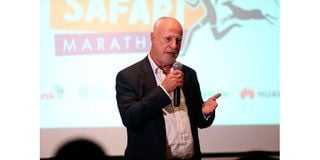Premium
Telemedine drive to help thousands of children in rural Kenya access healthcare

What you need to know:
- The project aims to reduce the number of referrals of sick children by allowing county health facilities to have access to specialists.
- It will also optimise the capacity and reach of healthcare delivery systems.
M-Pesa Foundation and Gertrude’s Hospital Foundation are now taking telemedicine to marginalised counties in a Sh203 million initiative expected to help more rural Kenyans access healthcare.
They have launched what they call Daktari Smart, a telehealth project targeting over 32,000 children in Samburu, Homa Bay, Baringo and Lamu counties, saying two more counties will be brought on board in the next phase.
The project aims to reduce the number of referrals of sick children by allowing county health facilities to have access to specialists. It will also optimise the capacity and reach of healthcare delivery systems. “Daktari Smart aims to address the delays in receiving adequate healthcare in rural and under-served areas through telemedicine. Patients who would otherwise have to spend a significant amount of time and money to travel long distances to urban areas to seek care will now be able to receive specialist care from their local health facility,” said Michael Joseph, chairman, M-PESA Foundation.
M-pesa Foundation said it has committed over Sh168 million towards the initiative while Gertrude’s Hospital Foundation will invest more than Sh35 million in the next three years.
Les Baillie, chair of Gertrude’s Hospital Foundation, said the goal is to transform communities by improving access to quality healthcare services to needy and disadvantaged children in the country.
"This involves embracing innovation and technology, as well as research.. The Daktari Smart programme will enable us to provide the much-needed specialist care to children in far flung areas as well as develop appropriate data and information to support paediatric healthcare in the country,” he said.
Daktari Smart is a kit that compromises electronic medical devices such as the electronic stethoscope, vital signs monitor, derma scope camera, ultrasound machine, otoscope which examines the condition of the ear canal and eardrum and the electrocardiogram used to check the heart's rhythm and electrical activity.
Unlike the conventional video conferencing, Daktari Smart allows the health care worker at the local partner health facilities to place the electronic medical devices such as a stethoscope or vital signs monitor on the patient.
The specialist at Gertrude’s Children’s Hospital is then able to see the patient and hear the sounds in real time without the interpretation from the health worker at the local facility.
The bandwidth requirement for the equipment is low, ranging from 512Kbps to 2Mbps, meaning that the platform can be installed in rural and under-served areas that still rely on 3G internet speeds.
Screens will also be used for video conferencing to facilitate regular capacity building for over 300 health workers serving in the rural health facilities; and training of 360 social workers and community health volunteers in the local community who will support in social mobilisation.
According to the Kenya Medical Practitioners and Dentists Board, one doctor serves 6,355 people, which leads to difficulties in getting access to a qualified medical professional.
"This ratio increases when it comes to specialists. The participating counties in this programme have only one or no paediatrician to treat children in these areas."





